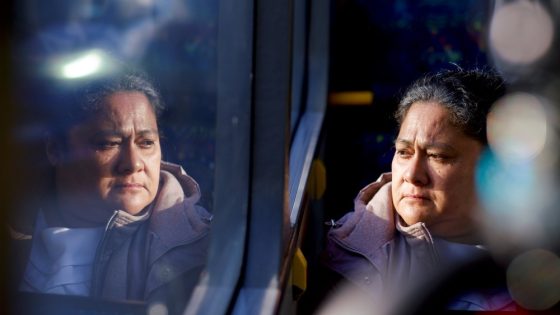The 44th running of the Hawaii International Film Festival presented by Halekulani will open with “Tinā,” an uplifting drama film that marks the feature directorial debut of Miki Magasiva, and close with Sori Fumihiko’s “Hakkenden: Fiction and Reality.”
In between, the festival will pack in 92 features and 114 short films, major awards for guests including Jimmy O Yang, Hong Kong’s Sandra Ng and documentary filmmaking star Stanley Nelson.
“This year, we have the largest selection of Hawai`i films in competition in the festival’s history, are presenting multiple films that explore Indigenous perspectives, narrative sovereignty, and the nurturing of cultural identity, and additionally, we are launching a new spotlight showcasing the best in television,” said Beckie Stochetti, HIFF executive director.
Hailing from New Zealand, with dialog in English and Samoan, “Tinā” sees Anapela Polata’ivao (“Our Flag Means Death”) portray a well-respected and gifted vocal coach endure family tragedy and venture out of her comfort zone to become a substitute teacher at an elite, all-white private school. There she forms a choir that begins her healing as a matriarch and caregiver.
In “Hakkenden: Fiction and Reality,” the “Perfect Days” star Yakusho Koji portrays a legendary writer who conceives a massive fantasy masterpiece and makes it his life’s work. But he begins to go blind before it can be completed and narrates it instead to his dearest friend.
The festival’s Centerpiece Presentation is Hawai’i-set “Moloka’i Bound,” directed by Alika Tengan’s and adapted from the director’s own short film of the same name. The drama follows the life of a wayward Hawaiian man (played by actor Holden Madrial-Santos), who is recently paroled after years of incarceration, but has difficulty acclimating to normal life in Hawai`i. He ends up doing all the wrong things for all the right reasons for his family. “Moloka’i Bound” also appears in the festival’s competition section.
The other feature films in competition are Arun Bhattarai, Dorottya Zurbó’s “Agent of Happiness,” from Bhutan; Luka Yang Yuanyuan’s “Chinatown Cha Cha,” from China and the U.S.; Yamanaka Yoko’s “Desert of Namibia,’ from Japan; Vietnamese-led co-production “Don’t Cry Butterfly,” by Dương Diệu Linh; Yang Yi’s mainland Chinese hit “Escape From 21st Century”; Neo Sora’s “Happyend,” from Japan and the U.S.; “Homegrown,” Michael Premo’s film about three Trump supporters; Jalena Keane-Lee’s “Standing Above the Clouds”; Matthew Rankin’s award winning offbeat comedy “Universal Language”; Brenda Michell, Michael Toledan and, Jennifer Wickham’s “Yintah,” about Canadian women protesting a pipeline development; and women defending their rights and reproductive futures in Maise Crow and Abbie Perault’s “Zurawski V Texas.”
“The distinction between cinema and television has become increasingly blurred over the past two decades, particularly with the rise of streaming platforms,” says Anderson Le, HIFF’s artistic director.
His selection for the HIFF’s inaugural Prestige TV Series Panorama includes: “Getting Lost,” a documentary series directed by Taylor Morden that revisits the global TV series phenomenon “Lost”; the Taika Waititi-directed pilot episode of Hulu’s “Interior Chinatown,” about an Asian American actor struggling against clichéd roles and stereotypes, both at work and in his personal life; and FX’s Japanese set epic “Shōgun.”
The new section dovetails with many of the festival’s awards. Justin Marks and Rachel Kondo, co-creators of “Shōgun” are named as recipients of the HIFF Halekulani Maverick Award. So too are “Interior Chinatown” showrunner Charles Yu and actor Jimmy O. Yang.
Other award ceremonies are based around comedienne, actor and producer Sandra Ng, who will be honored with the HIFF Spotlight On Hong Kong Filmmaker in Profile Award; Temuera Morrison, recipient of the HIFF Leanne K Ferrer Pasifika Trailblazer Award; and Stanley Nelson. He is “the foremost chronicler of the African American experience working in nonfiction film today,” according to the festival and receives its HIFF Halekulani Vision in Film Award.
The HIFF’s non-competitive selection acts as a yearbook of the best festival films from the likes of Sundance, Cannes and Toronto, as well as a festival of record for new talents from the Asia-Pacific region.
This year it includes: the world premiere of Seok Yang Woo’s “About Family”; Lou Ye’s “An Unfinished Film”; Kip Oebanda’s “Balota”; Andrea Arnold’s “Bird”; Steve McQueen’s “Blitz”; Jia Zhang-ke’s “Caught by the Tides”; Alexandre O. Philippe’s “Chain Reactions”; Zoe Eisenberg’s “Chaperone”; Kurosawa Kiyoshi’s “Cloud”; John Hsu’s “Dead Talents Society”; Jacques Audiard’s “Emilia Perez”; Gints Zilbalodis’ animated “Flow”; Mikhail Red’s “Friendly Fire”; Kuno Yuko and Yamashita Nobuhiro’s “Ghost Cat Anzu”; Sasha Rainbow’s “Grafted”; Su Hung-en’s “Hunter Brothers”; Walter Salles’ “I’m Still Here”; Mike Jonathan’s “Ka Whawhai Tonu: Struggle Without End”; Anselm Chan’s “The Last Dance”; Sue Kim’s “The Last of the Sea Women”; E.oni’s “Love in the Big City”; Paul Wolfram’s “Marimari” from Papua New Guinea and New Zealand; Van Tran Nguyen’s “The Motherload”; Rachel House’s “The Mountain”; Benjamin Rhee’s Sundance prize-winner “The Remarkable Life of Ibelin’; Pedro Almodovar’s “The Room Next Door”; Mohammad Rasoulof’s “The Seed of the Sacred Fig”; Nakao Hiroyuki’s “Sisam”; Karan Kandhari’s “Sister Midnight”; the world premiere of Albert and Herbert Leung’s “Stuntman”; Reema Kagti’s “Superboys of Malegaon”; Krunal Suresh Padhiar’s “Voice”; William Goldenberg’s “Unstoppable”; six-part “V/H/S Beyond” from Shudder; and Su I-hsuan’s “Who’ll Stop the Rain.”
The festival runs Oct. 3-13 in Honolulu and Oct. 15-17 in West Oahu. That is followed by screenings Oct. 19-20 on Maui, Oct. 21-23 on Lanai, Nov 1-3 on Kauai, Nov. 2-3 on the Big Island (Waimea), Nov. 7-8 on Molokai and Nov. 7-10 on the Big Island (Hilo).
Source Agencies


